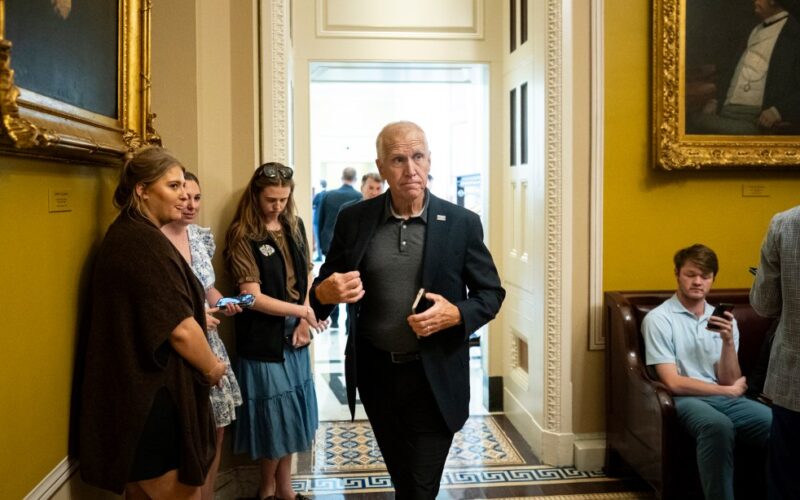North Carolina Republican Sen. Thom Tillis said Sunday he will not run for reelection next year, a day after he voted against advancing the so-called One Big Beautiful budget bill President Trump is touting.
“As many of my colleagues have noticed over the last year, and at times even joked about, I haven’t exactly been excited about running for another term,” Tillis said in a statement, citing a desire to spend more time with his family rather than “navigating the political theatre and partisan gridlock” that Washington politics has become. “It’s not a hard choice, and I will not be seeking re-election.”
The spending measure squeaked by in a 51-49 procedural vote late Saturday, paving the way for full debate. Tillis and fellow Republican Sen. Rand Paul of Kentucky voted no, along with the Democrats. The lead-up involved hours of tense, late-night negotiations with several GOP holdouts. Debate commenced on the 940-page bill Sunday after Sen. Chuck Schumer (D-N.Y.) forced a reading of the entire bill on the Senate floor late Saturday, which took 16 hours.
Tillis had pushed back against many Trump policies while maintaining a cordial relationship with the president. But after he opposed the budget bill Saturday over its drastic cuts to health care, specifically Medicaid, Trump threatened the two-term moderate with a primary, saying on Truth Social “numerous people have come forward wanting to run” against Tillis. After his Saturday vote, Trump said he had “hurt the great people of North Carolina” and called him “a talker and complainer, NOT A DOER!”
Tillis objected to the nearly $800 billion that the bill would cut from Medicaid over the next 10 years, throwing 11.8 million people off their health insurance and forcing rural hospitals to close, while raising the national debt by nearly $3.3 trillion. This “would result in tens of billions of dollars in lost funding for North Carolina, including our hospitals and rural communities,” forcing the state into “painful decisions” about Medicaid coverage and other services,” he said Saturday in a statement.
Paul has opposed the bill for raising the debt ceiling to $5 trillion. On Sunday the nonpartisan Congressional Budget Office said the Senate version would pile $3.2 trillion onto the national debt over the next decade, $1 trillion more than the House version’s $2.4 trillion addition.
Republicans are trying to push the bill through by a July 4 deadline set by Trump, skating along a razor’s edge with a 53-47 majority. Full GOP support is far from certain.
In his announcement Sunday, Tillis highlighted the erosion of congressional bipartisanship.
“In Washington over the last few years, it’s become increasingly evident that leaders who are willing to embrace bipartisanship, compromise, and demonstrate independent thinking are becoming an endangered species,” he said. “Too many elected officials are motivated by pure raw politics who really don’t give a damn about the people they promised to represent on the campaign trail.”
With News Wire Services
Originally Published:








